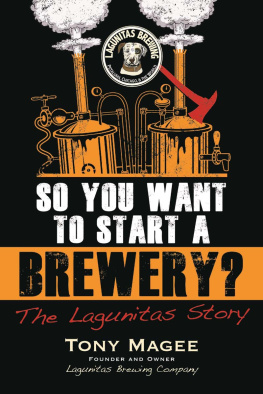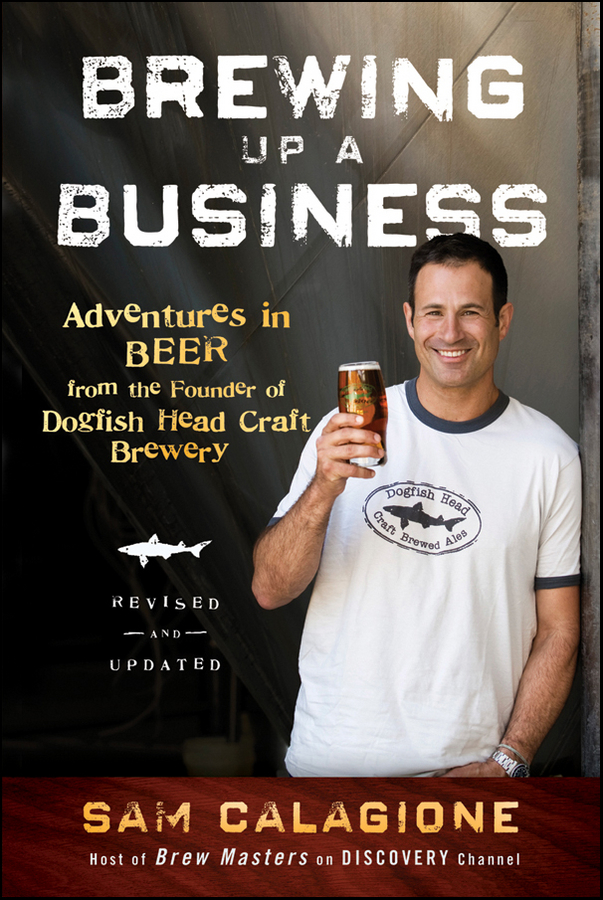Contents

Copyright 2011 by Sam Calagione. All rights reserved.
Published by John Wiley & Sons, Inc., Hoboken, New Jersey.
Published simultaneously in Canada.
No part of this publication may be reproduced, stored in a retrieval system, or transmitted in any form or by any means, electronic, mechanical, photocopying, recording, scanning, or otherwise, except as permitted under Section 107 or 108 of the 1976 United States Copyright Act, without either the prior written permission of the Publisher, or authorization through payment of the appropriate per-copy fee to the Copyright Clearance Center, Inc., 222 Rosewood Drive, Danvers, MA 01923, (978) 750-8400, fax (978) 646-8600, or on the web at www.copyright.com . Requests to the Publisher for permission should be addressed to the Permissions Department, John Wiley & Sons, Inc., 111 River Street, Hoboken, NJ 07030, (201) 748-6011, fax (201) 748-6008, or online at http://www.wiley.com/go/permissions .
Limit of Liability/Disclaimer of Warranty: While the publisher and author have used their best efforts in preparing this book, they make no representations or warranties with respect to the accuracy or completeness of the contents of this book and specifically disclaim any implied warranties of merchantability or fitness for a particular purpose. No warranty may be created or extended by sales representatives or written sales materials. The advice and strategies contained herein may not be suitable for your situation. You should consult with a professional where appropriate. Neither the publisher nor author shall be liable for any loss of profit or any other commercial damages, including but not limited to special, incidental, consequential, or other damages.
For general information on our other products and services or for technical support, please contact our Customer Care Department within the United States at (800) 762-2974, outside the United States at (317) 572-3993 or fax (317) 572-4002.
Wiley also publishes its books in a variety of electronic formats. Some content that appears in print may not be available in electronic books. For more information about Wiley products, visit our web site at www.wiley.com .
ISBN 978-0-470-94231-4 (pbk); ISBN 978-1-118-06185-5 (ebk); ISBN 978-1-118-06186-2 (ebk); ISBN 978-1-118-06187-9 (ebk)
For my sweet gal, Mariah. Since I have met you, I have grown to believe there is nothing we cant do together.
Foreword
THE PASSION OF THE INDIVIDUAL
The cheerful chap on the cover of this book has every reason to smile. The military-looking vehicle behind him delivers only the matriel of sociability. People love him for it.
Sam Calagione does not aspire to sit among the suits at a boardroom table and be a slave to the military metaphors of marketing. He fights his own battles, on behalf of people with individual tastes and against the tyranny of timidity, conformity, and the lowest common denominator.
When I first took my pen to the same cause, 30 years ago, my colleagues asked if I had given up serious journalism. Did I no longer want to change the world? Almost all of them took beer seriously, but they nonetheless thought that writing about it was a frivolous pursuit.
Like Sam Calagione, I can simultaneously have fun in my job but pursue it with serious intent. Those of us who are truly demanding about our beer are a minority, but we are by no means insignificant in number, and we are willing to pay more for a brew we like.
For us, good beer is essential to the quality of life. People who love wine or bread or cheese, for example, would take the same view. These are all perfect products for the entrepreneur, but so are scores of others. In my view, a passion for the product is the first essential. If you have a passion, look at that first. Whatever excites your passion, there are surely others who feel the same way.
Passionate beer-lovers are seeking character, with its own individualistic interplay of flavors. Big breweries have the technical know-how to make such products but their kettles are too large for our market. Their cost accountants want to produce beers low in raw materials and high in acceptability. Their marketing people believe they can think small, but they cannot; well, not small enough. To have individualistic beers, we need small breweries. If you are not passionate about beer, you may be unaware of the renaissance of craft brewing in the United States since the late 1970s.
When I began writing about beer, there were fewer than 50 brewing companies in the United States, almost all of them making very similar beers. Today, there are more than 1,500, brewing beers in more than 100 styles. Many of those beers are highly individualistic, but none more so than Dogfish Heads.
Their individuality is suggested by their names. I especially like Raison dEtre (both the name and the beer); then Dogfish Head exceeded it with Raison dExtra.
As his verbal dexterity suggests, Sam was an English major. He studied fiction and poetry. Im told he takes Walt Whitman to bed with him, though I learned this from a young woman who has no firsthand knowledge of that. I think she wished she had. You are spending the whole day with Sam Calagione?! Tomorrow?! Hes the Robert De Niro of brewers! He hasnt made a feature film yet, but he has been a Levis model and made a rap record.
Sadly for female admirers, he seems to have found the perfect wife while still at college. He has the ingenuity to invent new equipment for the brewhouse, and the muscle to row his beer across the Delaware River.
Now it turns out he can write a book, too: brisk, readable, and instructive. A man of such diverse attributes, abilities, and achievements sets an example that makes us all look deficient.
What can we do about this? I can write a Foreword, which aggrandizes myself: I become someone whose blessing he needed. And you? Read the book and brew up your own business. You dont have to make beer. Just make a million....
Michael Jackson
Michael Jackson is the worlds best-selling author on beer and whiskey. His most recent books are The Great Beer Guide (New York: DK Inc.) and The Complete Guide to Single Malt Scotch (Philadelphia: Running Press).
Preface
In my college days I was an English major (fatefully, I minored in beer drinkingone mans disciplinary probation is another mans vocational research). I have always enjoyed reading more than studying. When I had an epiphany to open a brewery, I figured I could learn everything I needed to succeed in business by reading business books. Boy, was I wrong. However, I did learn a lot from reading great books by and about the business leaders who came before me. I have a shelf full of them. I especially enjoy books about entrepreneurs who started little companies with big visions: stories about women mixing up hand lotions in their home blenders and packing them in ketchup bottles, or guys cooking up the revolutionary sole (soul) of a running shoe in their waffle makers.
But nearly all of these books sit dormant on my bookshelf. I earmarked and underlined hundreds of inspirational philosophies and schemes that motivated me toward my dream of opening my own company. But I always seemed to lose interest in these stories at about the same pointjust after the hero slays the dragon and brings the great idea to market, when the MBAs, bankers, and accountants bum-rush the stage and in the flash of a moment the company goes public. When my eyes come across that horrific, inevitable phrase maximizing shareholder value, they pretty much glaze over.







